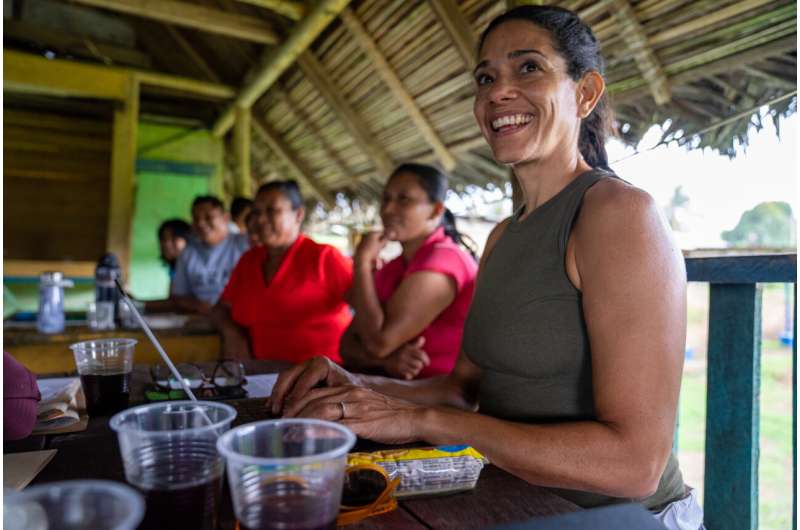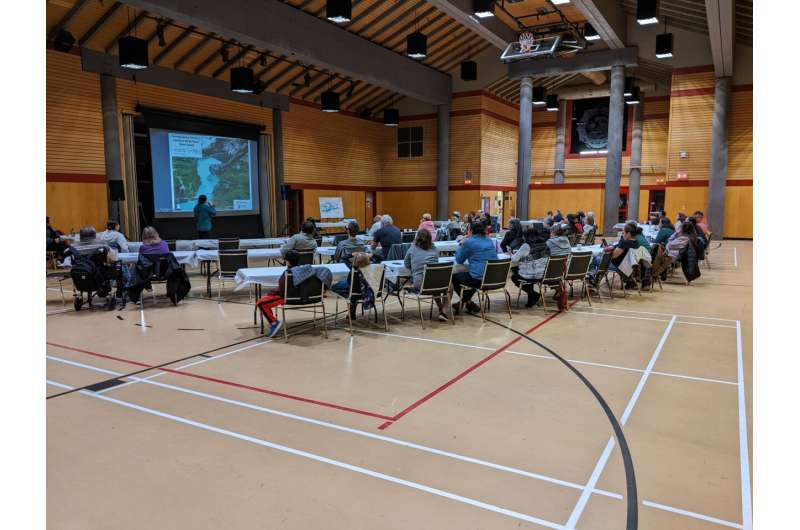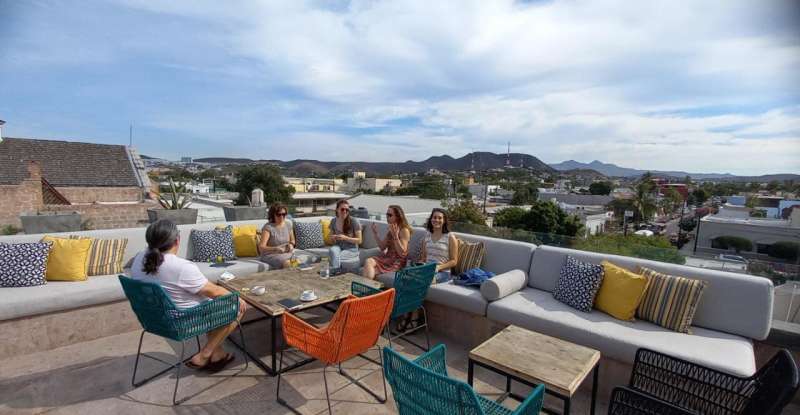This article has been reviewed according to Science X's editorial process and policies. Editors have highlighted the following attributes while ensuring the content's credibility:
fact-checked
peer-reviewed publication
trusted source
proofread
Centering relationships between people and place: A critical step towards improving science's contributions to society

Slowing down the pace may not be common in academia, but it could lead to better science to support our planet through the current climate, biodiversity and social justice crises. This is one approach suggested by a diverse group of marine conservation scientists who were brought together in 2021 by the COMPASS Leaders for Sea Change Science Communication program. In a new paper published in Proceedings of the National Academy of Sciences (PNAS), the co-authors consider three pathways to better connect with the places they study.
Frequently, scientific expertise to address the global change crisis comes from a place of privilege. Research findings often come from the Global South but are disseminated, debated, and championed by well-funded institutions and experts in the Global North. Despite much of the science being conducted in the places most vulnerable to the pressing challenges of our times, the knowledge, histories, and Indigenous wisdom of local communities are often overlooked or undervalued by the scientific community.
The co-authors of the paper "Centering relationships to place for more meaningful research and engagement" argue that this type of knowledge "extractivism" may occur because of time, capacity, funding, or personal constraints. However, they also contend that extractive human behavior toward the natural world and each other is what has led us to our current global crises in the first place.
They argue that building relationships to places of study and their people would lead to more fair science and more accurate and meaningful research outcomes, and present three pathways aimed at building deeper connections between natural scientists and the places they study.
The first pathway is to deepen reflection and communication about relationships with places. For example, this pathway can be practiced by immersing oneself in local communities, learning about the historical and social-ecological narratives of the places of study, and allowing these experiences to shift perspectives, refine research goals and expand the societal relevance of research findings.
This pathway also encourages expanded land acknowledgements. Researchers are encouraged to seek guidance from local and Indigenous resources to precede public communications with recognition of past and present Indigenous presence in these spaces. An additional suggestion is to expand positionality statements beyond mere disclosure of personal and professional backgrounds to include a broader spectrum of influences shaping the research process, such as the geographic, socioeconomic, institutional, and cultural contexts of the scientists involved, to show where their perspectives come from.
The second pathway is to strengthen collaboration among research teams and partners, which entails building a foundation of mutual respect, trust and knowledge exchange between scientists and individuals who may be local or Indigenous to the place of research. Understanding their worldviews and expertise may lead to new ways of thinking about and relating to a place.
This pathway encourages collaboration and engagement with partners outside of academia and project co-creation with local partners, a common practice in the social sciences. This could result in research outcomes that are meaningful and transformative to those who may be impacted by research processes, improve public trust in research findings and make knowledge more accessible.

"Change must happen, and this is one way we can contribute toward a cultural shift to make the research process more equitable and relational, as a way to move away from extractive paradigms," said lead author Fiona Beaty, an early-career scientist from the University of British Columbia.
Recognizing that developing these deeper relationships to place takes time and energy, and that a majority of natural sciences institutions or research systems do not currently incentivize this type of work, co-authors of the PNAS paper propose transforming systems of knowledge creation to foster place-based roots as a third pathway.
They recommend that institutions consider restructuring training, evaluation, and funding systems throughout various career stages. A critical area would be to revise training and research opportunities within both undergraduate and graduate programs. Hiring and evaluation processes could also be transformed to encourage the development of deep relationships with places of study.
Finally, funding systems could support collaboration outside of academic systems by incentivizing public research dissemination activities and community engagement alongside traditional metrics of academic success, such as peer-reviewed publications.
"Natural science institutions throughout the world and particularly in the global north could reshape their reward systems, which impacts researchers' lives, promoting place-based and deeply rooted research," said Beaty. "It's really hard for individuals to make changes if they're constantly battling the system."
The authors also propose the development of site-based research capacity, which may look like many things; for example, empowering local scientists to lead research aligned with community needs or creating site-specific centers that employ local experts or collaborate with community organizations to produce knowledge that is tailored to their specific contexts.

"These perspectives are the result of multi-year conversations where we shared experiences among one another and recognized the outstanding value of and complications involved in genuine and impactful engagement," said co-author Katharine Bear Nalven, from Oregon State University.
Beaty hopes this paper inspires early career researchers by giving them a range of options and offering guidance. She also seeks to encourage established researchers to see how they can contribute to change within academia.
"We do not expect everyone to take up all our suggestions, because it can be overwhelming, but different people may have different entry points," said Beaty.
Ana K. Spalding, co-author and director of the Adrienne Arsht Community-Based Resilience Solutions Initiative at STRI, views this paper as a testament to the effectiveness of training programs such as Leaders for Sea Change.
"Our aspiration is for initiatives like this, focused on capacity building and leadership training, to gain momentum and underscore the significance of collaboration," she said.
More information: Fiona Beaty et al, Centering relationships to place for more meaningful research and engagement, Proceedings of the National Academy of Sciences (2024). DOI: 10.1073/pnas.2306991121
Journal information: Proceedings of the National Academy of Sciences
Provided by Smithsonian Tropical Research Institute




















